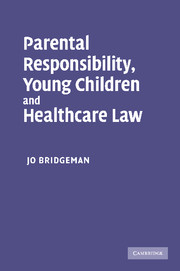Book contents
- Frontmatter
- Contents
- Acknowledgements
- Table of cases
- Table of legislation and international instruments
- 1 Parents, young children and healthcare law
- 2 Child-centred healthcare services for children
- 3 Child health and parental obligations
- 4 In the best interests of the child?
- 5 The quality of life of severely disabled children
- 6 Obligations and caring responsibilities
- 7 Relational responsibilities
- Bibliography
- Index
2 - Child-centred healthcare services for children
Published online by Cambridge University Press: 17 July 2009
- Frontmatter
- Contents
- Acknowledgements
- Table of cases
- Table of legislation and international instruments
- 1 Parents, young children and healthcare law
- 2 Child-centred healthcare services for children
- 3 Child health and parental obligations
- 4 In the best interests of the child?
- 5 The quality of life of severely disabled children
- 6 Obligations and caring responsibilities
- 7 Relational responsibilities
- Bibliography
- Index
Summary
Introduction: children's healthcare services
Feminist analysis has exposed the misconception that there is a public realm of government and a private realm of the family which is beyond the scope of regulation. The extent to which parents are given the freedom to care for their children as they consider appropriate or there is intervention in the family to ensure that parents conform to norms of ‘good’ parenting is a matter for political determination. The Every Child Matters agenda, to be implemented for healthcare services primarily through the National Service Framework for Children, Young People and Maternity Services, sets out a vision for children's services which may result in an unprecedented degree of intervention into the private realm of the family. The specific context for this policy agenda is exposure of long-term neglect of children's healthcare services by the Bristol Royal Infirmary Inquiry, the failure of health, social, education and policing services to work together to protect Victoria Climbié and a commitment on the part of the Labour Government to delivering an NHS for the twenty-first century which is centred around the needs of the patient. This chapter will consider the recent history of the provision of healthcare to children through the findings of these reports and outline the standards for children's healthcare services currently in the process of implementation. Given the context of the background to these developments, it is possible to understand the four-fold aims of: developing child-centred services; providing targeted services embedded within universal services for all children; ensuring that services are ‘joined-up’ to ease the child's journey through health and social care; and recognition of the respective roles of parents/carers and professionals in securing the health and well-being of children.
- Type
- Chapter
- Information
- Publisher: Cambridge University PressPrint publication year: 2007



